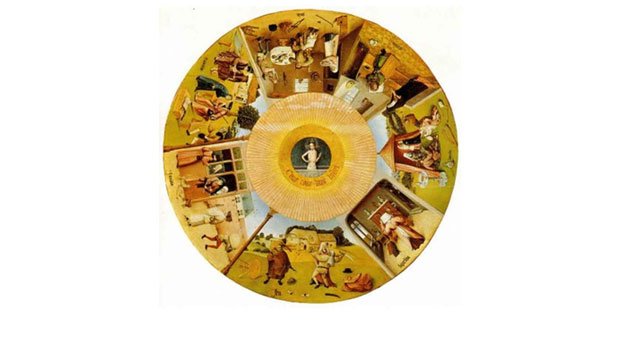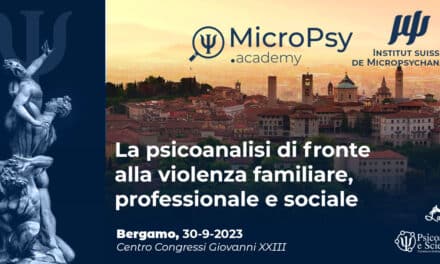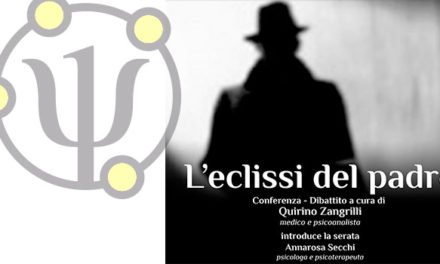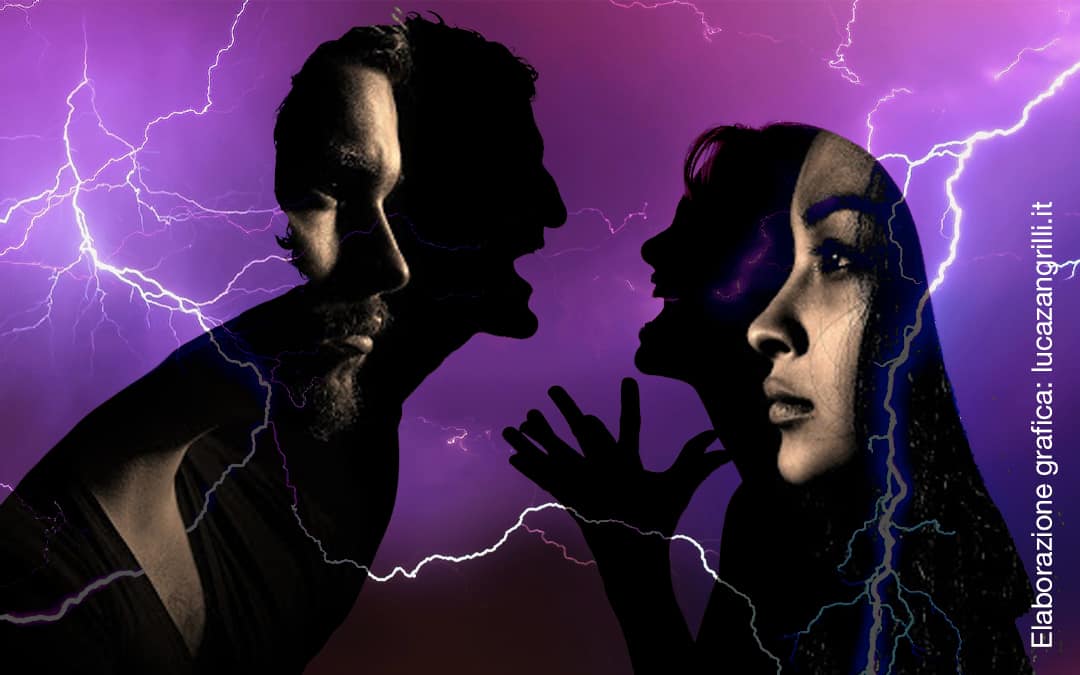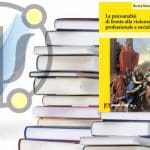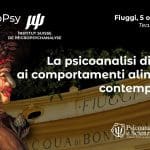Summary of the Speach “Omeopathy: Lesson on the seven capital sins” , Cervaro (Fr) dic 14th 2002.
I Shall try to demonstrate that the so called “seven deadly sins” is an attempt to ritualize a fundamental event of the human being psychism: the murder of the primigenital father and consummation of totemic meal; in the rite is concentrated every stage and aspect of the events; the seven deadly sins is in reality only one: the Deadly One. The meaning is easily known , considering the latin word “Caput” which means “head” .

J. Levi reminds us that the second word used to indicate “sin” is ‘A –VO –N (Gn., 15,16; 44,16; Ex., 20,5; 28,38; 28,43; 34,7).
Es. 34,7 is particularly interesting because it says: “I’ll make father’s sin to fall on sons” A contradiction to Tora’s prescriptions: “Father will never be deadly punished for his sons’s sin and son will never be deadly punished for father’s sin. Each one will be deadly punished for his own sin (CH –T .’)” (Detut., 24,16). But while in Ex., 34,7 is used ‘A-VO – N, in Deut., 24,16 is used CH –T –‘. It seems that A –VO –N is not to be estimated and expiate sin; something which is transferred from a generation to the following one.
From a psychoanalitical point of view an entity which can not be estimated, indicates the loss of perceptive refereces, may be because they got lost in the time or because the entity is protected by deny psychological processes, since it must be very painfull to be fully aware of the happening and it’s easier to forget or misunderstand, instead of elaborating.
By analyzing biblical citations we can suppose that the sin was only a sin against god and the violation of a taboo connected to god’s body. Such a sin could be expiated only with death. Later instead of death it was allowed to sacrify a tup, such as in Isaac sacrify that was substituted by the tup. Tup is a representation of god, so his sacrifice also hints to the object against whom the sin has been done, by condensation of body and expiation (Iakov Levy personal interview).
Toward the end of his life S. Freud has concentrated his left energies to understand peoples’ psychology and to identify their common root of guilt feeling. The result is to be found in “Totem an taboo” (1912-13) “People psychology and Ego analysis” (1921) “Moses and monoteistic religion (1934-38).
Freud accepts 1874 Darwin’s hypothesis on primordial horde, according to which in very antique time there was a kind of social organisation called “primordial horde”, where people live in small groups dominated by a a strong, violent and gelous man who was the only owner of any woman. He was entitle to sleep and have children with them and he took his women away from his sons and from any other young man. He was used to evirate them when they try to threat his power. Freud thought that repetition of such a traumatic event along the evolution of human being had left a memory-trace where the original event, really consummated, was substituted by inconscius representations and phantasies (People psychology and Ego analysis 1921 – Moses and monoteistic religion, 1934-38).
Thanks’ to this hypothesis we can explain why nowadays, after thousands of years in which sons’ eviration has not been put into practice, as it was done in the “primordial horde” according to Darwin’s hypothesis, inconscious contents that come out during psychoanalysis with people of different nationality, culture and religion, regard a real psychic experience of eviration.
This phantasy is so intense tha male analysed, once finished their psychoanalysis often says: “ Doctor I assume my penis has become longer in the last few months: is it possible?- or – “Yesterday, by chance I have seen my fathe’s penis. He was on his bed at the hospital and I thought: it’s not enormous as I always believed”.
Freud reminds us that “If we study childrens’ reaction to traumatic events, we are very often surprised to find out that they are far from the real individual experiece; such reactions are closer to a philogenetic event and can be generally explained thanks to its influence (S. Freud, Moses and monoteistic religion, 1934-38, Opere Vl 11, Boringhieri, Torino, 1975).
S. Freud has deeply studied totemism, a social organisation system which existed everywhere at the beginning of civilisation.
Totem is a category of objects to which primitive have a supersticiuos respect because they believe that there is a very special relationship among their own person and the totem. We can distinguish at least three kind of totem: 1) clan’s totem which belongs to the entire clan and is conveyed from one generation to the other; 2) sex totem, which belongs to any male or any female of the tribe, excluding in both cases the other sex;3) individual totem, which belongs to a single person and is not conveyed to an other person. Clan expects protection and favours from his totem.
Social aspect of totemism is mainly expressed in a strictly observed commandment and in a strong restriction. Clan’s members consider themselves as brothers and sisters (even if they are not biological relatives). They have the duty to help one each other and they cannot’ marry or have sexual relations with any member of the clan ( a very strong and wide incestuous taboo).
Original totemism is characterized by the following features: all totem were animals, considered to be the ancestors of the tribe. Totem was inherited only on mother line. It was forbidden to kill the totem. Members of the same totemic clan could not have sexual relations.
Relation among children and animals is similar to the one among primitive man and the animal. There is only one trouble which may appear in the relationship among children and animals: the child, all of a sudden starts to be afraid of certain races and tries to have not contact with them. Infantile zoophobia are so common that whenever they do not appear they must to be enquired in anxiety dreams with animals. They must be considered a transiton physiological stage of psychic maturation process.
Zoophobia indicates a splitting on animals of parents’ fear. Psychoanalalitic material shows the several associations, more or less important, where you can find such splitting. We can say that in zoophobias appear some characteristics of totemism: animals having an aggressive reaction against us. According to the famous rataliation law “what you have done will be returned to you” If totemic animal is the father, the two main commandements of totemism, the two taboo prescriptions which constitute its nucleous – do not kill and do not have sexual relationship with any woman belonging to your same totem – have the same contents of oedipus murders who killed his father and married his own mother and they also coincide with the two primordial desires of the child. Insufficient repression of these desires or their reawake, make the universal nucleous of every psychoneurosis. Sacramental killing and collective consumption of totemic animal, otherwise forbidden, is a very important element of totemic religion.
Feast is an excess allowed, or better offered, the solemn violation of a prohibition. Excess is in the feast it self; happy mood is because one is allowed to do what is usually strongly forbidden. By eating totem, members of the clan purify themselves.

Animal’s killing, otherwise forbidden, becomes an occasion to feast and nevertheless the animal is killed and even lamented..
The antique totemic meal falls nowadays in the original way as a sacrifice.
It has been supposed that god was the totemic animal. Later on he lost its sacrality as well as sacrifice has lost relation to totemic feast: it becomes a simple offer to godness, a renunciation in god’s favour.
During the centuries we can follow identity among totemic meal and animal sacrifice, among mans’ sacrifice and cristian Eucharist and finally recognize in these solemnity consequences of the crime which has oppressed the man and, nevertheless, they where so proud of it. Finally cristian Eucharist is a new elimination of the father, a repetion of the act to be expired.
And now we can get to the famous seven deadly sins.
They are:
– pride
– avarice
– lust
– anger
– gluttony
– envy
– sloth
This is the order to be followed in the rite. We don’t know if the sequence is always the same, but it is really suggestive for the thesis I’m exposing.
Proscenium is occupied by a small group of human being who live in crowds as it is for many other species with is a social organization. There is a dominating tirannical male, free from heavvy labours, hunting and harvesting. He sleeps with any woman of the tribe, kills the jung males who challenge his leadership.
He is the proud. The italian word “superbo” comes from latin superbus and from a more ancient word superbhos which can be split into super and bho. The indoeuropean root is bhewe (to grow), so the meaning is: Who is above the growing people.
Freud says: “Each component of the horde were submitted to link as well as nowadays, but the father was free. Even if he was isolated, his intellectual actions were free and authonomy, his will did not have to be endorsed by the others’. Consequently we suppose that his Ego was sparely linked, that he doesn’t love anybody but himself and that he loved the others only in relation to his personal needs. His Ego did not give to the objects anything that was strictly necessary”. People psychology and Ego’s analysis 1921).
I can add that he keeps for himself the most precious and desirable goods, women, pretend the harvest and the first bite to the hunt: avarice.
He is the only man of the horde who can freely express his genital libido: lust.
He’s the only owner of women: can realize the strong fusion among sexuals and ego instincts. Libidinal way out is fused with pressure to genoma perpetuation.
The jung brothers could only practice onanism or omosexual relation. The omosexual alliance among brothers will give them the courage to challenge the father.
Here is anger the disclose of the homicide streght.
Parricide his done by the brothers, but that’s not all: they also eat and orally take pleasure from the father’s body, in order to incorporete his phallic strenght: gluttony.
Probably horde’s women were not alloweded to the totemic meal. It is well-known that in primitive populations and not only (let’s just thing of cristian sacerdocy) women were not permitted to participate to religious rite. Nowadays woman is entitled to give any sacrament except the Eucharist, the ritual eating of Crist -God’s body. In other words she is not introduced to the totemic meal, so excluded from phallic father’s strenght: envy.
Right after Bacchanal rite comes standstill and enjoying new acquired privilendges:sloth.
But why are the deadly sins seven? There are many more antisocial behaviours and some of them are more eversive, such as stealing.
We enter in ritual world.
In “II numeri sacri e il loro simbolismo” J. Levi and L. Previdi states a very important concept: seven means agreement, oath.
Freud’s final hypothesis is that parricides were bourdered by a terrible sense of guilty for the father murder ( leit motiv of every world tragedies) and that they had sworn, by signing a sacral agreement, that it should never happen again. Killed father had become much stronger : now he had become the God father and they should only obey.
Parricide is the real original sin, while the usually called original sin is a hided parricide: sons try to take God’s place by committing a proud sin: they want to eat knowledge tree fruit, so take God’s place.
Horde parricide is also represented in Satan genesis: Satan leads an other angels group to rebel against God, much time before Adam and Eve falling. Even if he was perfect (infact in creation everything was “very good”, Ge 1:26), Satan revolted against God to prevail.
In Ge, 3 when Eve was tempted, Satan seduced her by saying “God knows that the day you eat I, your eyes will open and you will be like God, you’ll know Good and Evil” (Ge. 3:5) . It seems very clear to me that the real knowledge fruit was God .
Number seven is non only linked to expiation and purifiying rites.
As J. Levi underlines, there are many examples in the Holy Writings that number seven is connected to touching taboo, but the most important taboo mentioned by the psychohistorical specialist from Tel Aviv is tha deads’ one “Who ever touch a dead people will be dirty for seven days” (Nm.19,11).
An extraordinary condensation spliting and subdivision action has been done in order to miss the links with the original happening of each religion: the parricide, the totemic meal, the brothers agreement, the rite creation, the sin born: the seven deadly sins is only one: the killing of the Head.
Written by: Quirino Zangrilli © Copyright
Translated by Bruna Marzi
Nel 2024 riceve il Premio Accademico d’Onore della Accademia Culturale Internazionale Cartagine 2.0.
Doctor Quirino Zangrilli was born in Fiuggi in 1955. Graduated with honours in Medicine and Surgery in 1980, he practices Psychoanalysis, with intensive method, since 1982. He is author of 72 scientific pubblications. He has attended as speaker or president of session to many national and international scientific Conventions. His book “La vita:involucro vuoto” (Life: empty involucre), published by Borla in 1993, has been in use by the Chair of Dynamic Psychology at Turin’s University since 1994. He is the author and founder of the multimedia review “Psicoanalisi e Scienza” (Psychoanalysis and Science), the most read Italian on line review of psychoanalysis. In 2012 he participated as a Speaker at the Scientific Festival of BergamoScienza. In 2013 he illustrated his research on the maternal-fetal interaction in the Special Session of the XI World Congress of Perinatal Medicine in Moscow with his relation “Intrauterine Imprinting”. He is visiting teacher at Moscow Institute of psychoanalysis and training psychoanalist of Swiss Institute of Micropsychoanalysis.
In 2024 he received the Honorary Academic Award of the Carthage 2.0 International Cultural Academy
Le Le Docteur Quirino Zangrilli est né à Fiuggi en 1955. Diplômé avec mention en Médecine et Chirurgie en 1980, il pratique la psychanalyse depuis 1982, en utilisant une technique intensive. Il est l’auteur de 72 livres et publications scientifiques. Il a participé en tant que conférencier ou président de session à de nombreuses conférences scientifiques nationales et internationales. Son livre “La vie : enveloppe vide”, publié par Borla en 1993, est adopté depuis 1994 par la Chaire de Psychologie Dynamique de l’Université de Turin. En 1994, il a reçu le “Prix national Ciociaria de médecine”. Il a conçu et fondé le magazine multimédia “Psicoanalisi e Scienza”, qui est le magazine de psychanalyse en ligne en italien le plus suivi au monde. (Source : Entireweb, Alexa, Google, Virgilio, Arianna., etc.). En 2012, il a participé en tant que conférencier à la colloque scientifique de BergamoScienza. En 2013, il a exposé ses études sur l’interaction materno-fœtale lors de la session spéciale du XIe Congrès mondial de médecine périnatale à Moscou avec le rapport “Intrauterine Imprinting”. Il est chargé d’enseignement au cours de spécialisation de trois ans en psychanalyse, psychothérapie psychanalytique et consultation psychanalytique à l’Université de Moscou. Il est membre didacticien de l’Institut Suisse de Micropsychanalyse et de la Commission pour la Pratique de celui-ci.
En 2024, il reçoit le Prix Académique Honoraire de l’Académie Culturelle Internationale Carthage 2.0.
В 2024 был награжден Почетной академической премией Академии Международной Культуры «Карфаген 2.0».

